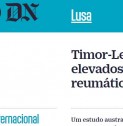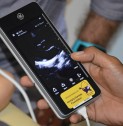Funders:
- Heart Foundation (Vanguard Grant)
- HOT NORTH
- ROMAC - Rotary Oceania Medical Aid for Children
- Snow Foundation
Collaborators:
- NT Cardiac
- Malabam Health Board
- Hospital Nacional Guido Valadares
- Maluk Timor
Aims:
- To screen school students in Timor-Leste and the Northern Territory, using echocardiography to identify cases of rheumatic heart disease (RHD)
- To determine the sensitivity and specificity of a highly abbreviated echo protocol for the detection of RHD, using a single parasternal long axis (PSLAX) view obtained by handheld echo machine
- To demonstrate the feasibility of using briefly trained health workers doing PSLAX view echos to detect RHD
Summary:
We will screen children for RHD in a remote Northern Territory community and in Timor-Leste, to find new cases, so that these children can receive effective prevention with penicillin injections.
Echo screening usually requires full exposure of the chest, which is time consuming and invasive, and makes screening in public settings such as schools challenging. Therefore, we will test a different approach to screening: using trained health workers to do echo screening with a single view at the centre of the chest, which can be done rapidly, without removing clothing. If this works well, it will be possible to train health workers so that they can screen many more school aged children more efficiently.
Implications for policy and practice:
We plan to use the findings of this study to establish a strategy for implementing this new rapid approach to screening on a large scale in Northern Australia and in Timor-Leste, enabling detection of many cases of rheumatic heart disease.
Chief Investigator:
Project Manager:
- Dr Helen Fairhurst
Project Dates:
- 1 September 2017 – 31 August 2018










